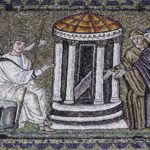We run our website the way we wished the whole internet worked: we provide high quality original content with no ads. We are funded solely by your direct support. Please consider supporting this project.

Cross-Shaped Transcendence
Hellenistic philosophers traditionally embrace a conception of God as the simple, necessary, and immutable One. They do this in order to try to explain the “unmoved mover” who is absolutely distinct from the ever-changing, composite, contingent world. However, we must be clear that it is misguided for Christian theology to follow this path. If we define God’s essence over-and-against creation, we are defining God’s essence over-and-against Christ, the very one who is supposed to be the definitive revelation of God’s essence.
If theologians are concerned with preserving the absolute distinction between God and creation, this is certainly laudable and necessary, but this is not the way to do it. For preserving this distinction is without value unless we are at the same time remaining faithful to the revelation of God in Christ by placing our complete trust in it.
Hence, rather than starting with a concept of God that moves away from becoming, contingency, dependency and suffering, I submit that all theological reflection must start, and remain oriented around, the contingent fact that God became a human and suffered at the hands of wicked humans and fallen angels as he suffered a God-forsaken death for us on the cross. From this cross-centered perspective, any who feel the need to construe God’s transcendent essence as excluding contingency, becoming, dependency, and suffering can only be understood as trying to protect God’s transcendent essence from his own self-revelation—as if they knew God’s transcendent essence better than God!
I rather believe that what it means to affirm Christ as the Incarnation of God is that we consider the experiences of the man Jesus to also be experiences of the divine Jesus. This means that the suffering of the man Jesus on the cross must be accepted as the suffering of God on the cross. Indeed, it is precisely God’s self-sacrificial suffering at this juncture that most unambiguously reveals his eternal essence. To insert any wedge between the divinity and humanity of Christ at this point is simultaneously to undermine the revelation of God in the crucified Christ and to derive a concept of divine transcendence that is sourced outside the crucified Christ.
The only way to remain faithful to the revelation of God in the crucified Christ as we reflect on God’s “wholly other” transcendence is to refuse to speculate about a hypothetical transcendence over-and-against this revelation. Instead we must seek to discern God’s transcendence in the “wholly other” quality of this revelation. As I interpret him, this is close to what Luther was getting at with his conception of God’s hiddenness. He was noting that the utter incomprehensibility of God is most clearly unveiled precisely when God is most unambiguously revealed. God’s unfathomable distance from us is most profoundly revealed precisely when God stoops an infinite distance to come nearest to us, diving not only into our humanity, but also into our sin and our curse. Hence, the definitive disclosure of God’s “wholly other” transcendence takes place when God enters into our limitations and sin on Calvary.
God isn’t transcendent because he’s “above” becoming and suffering; he’s rather transcendent in the utterly unfathomable loving quality of his supreme becoming and supreme suffering.
While the cross is the quintessential revelation of God’s transcendence, we can also discern the cruciform transcendence of God reflected in every aspect of Jesus’ life, ministry and teachings. For example, we see God’s beautiful cruciform transcendence reflected in the shocking way the all-holy God accepted and befriended prostitutes and others who were judged to be the worst of sinners in first century Jewish culture. His incomprehensible otherness is revealed as well in the shocking way he searches for the one lost sheep, accepting and ministering to the poor, the maimed, the oppressed, the diseased and other lost sheep who were ignored or despised in first century culture. Indeed, every counter-cultural aspect of Jesus’ life revealed God’s transcendence and thereby pushed back every aspect of society and creation that is not in line with God’s cross-shaped beauty.
Photo credit: hepp via Visual Hunt / CC BY-NC
Category: General
Tags: Cross, God's Character, Nature of God, Transcendence
Topics: Attributes and Character
Related Reading

“Whatever it means, it cannot mean that.”
pure9 via Compfight Roger Olson wrote a great article a couple of days ago entitled Why (High) Calvinism Is Impossible. He points out that there is no way to understand God as “good” while also believing in double predestination. The idea that God predestines some to heaven and a vast majority to hell for his “glory”…

Podcast: Is it Okay to Pray to God as Mother?
Greg considers God’s gender and the potential power of this identification can have on faith. http://traffic.libsyn.com/askgregboyd/Episode_0239.mp3 Title: Mother Artist: Arthur Lewin-Funke Courtesy of the Metropolitan Museum

The Revelation of God in the Cross
The cross cannot be understood apart from the resurrection, just as the resurrection can never be understood apart from the cross. They are two sides of the same coin. If you consider the cross apart from the resurrection, then the crucified Christ becomes nothing more than one of the many thousands of people who were…

What the Resurrection Says About the Cross
As with every other aspect of Jesus’ life and ministry, even the resurrection must be understood in light of the cross. This event was not just the resuscitation of a random corpse. It was the resurrection of the Incarnate Son of God who had fulfilled the human side of the God-human covenant by living a sinless…

Isn’t the World Unsafe If God Doesn’t Control Everything?
If God isn’t in control of everything, the world feels unsafe. If the future is open and if things can happen outside of God’s will, what guarantee is there that there is a point to a person’s suffering? Maybe it’s all just bad luck. My experience has been that many of those who honestly examine…

The Greatest Mystery of the Christian Faith
God has always been willing to stoop to accommodate the fallen state of his covenant people in order to remain in a transforming relationship with them and in order to continue to further his sovereign purposes through them. Out of love for humankind, Scripture tells us, Jesus emptied himself of his divine prerogatives, set aside…
